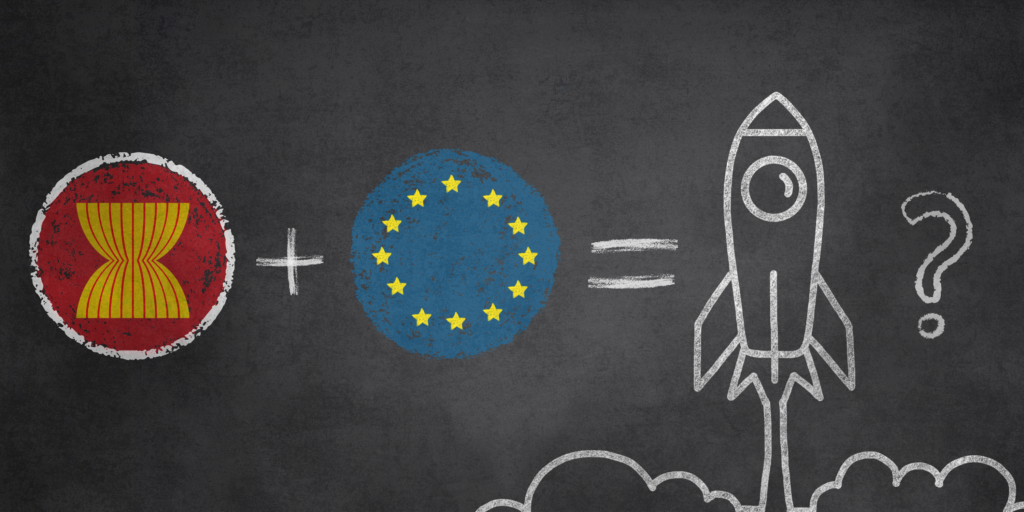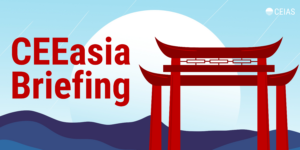ASEAN member states have space aspirations, but their progress is complicated by a lack of regional cooperation and being caught in an emerging “astropolitics” between the US and China. However, this dilemma offers a unique opportunity to enhance EU-ASEAN cooperation.
Key takeaways:
-
The new space age is attracting diverse actors, yet the high space exploration cost prevents developing nations from fully participating.
-
The US and China are taking advantage of developing nations’ space aspirations to support their respective goals through their multilateral treaties.
-
Despite their goal of space aspiration, ASEAN member states have failed to initiate regional space cooperation, thus providing an opportunity for enhancing EU-ASEAN cooperation.
During the 20th century, only two countries could compete in the “space race”—the United States and the Soviet Union. However, a diverse array of countries are lining up to run in the “new space race”, attracted by the economic and social rewards. According to a report, the space economy—space-related products and services, such as broadband and GPS—was worth around $469 billion in 2021 and is expected to be worth even more in the coming decades. Still, the high cost remains an issue, and Washington and Beijing are establishing cooperation frameworks and treaties to court developing countries. The United States has introduced the Artemis Accords, while China has developed the International Lunar Research Station (ILRS) program. However, these initiatives are closely tied to the geopolitical objectives of their respective countries, making other nations or blocs with their own space ambitions, such as the Association of Southeast Asian Nations (ASEAN), hesitant about joining.
Many Southeast Asian countries have clearly defined space aspirations and have developed policies to support them. Yet, progress has stalled because of a lack of financial resources, technical expertise, and political will. Additionally, there is no regional space agency within ASEAN to coordinate and support these efforts. This gap presents a unique opportunity to enhance EU-ASEAN cooperation, potentially strengthening the region’s space capabilities through collaboration.
ASEAN’s space ambitions
EU-ASEAN cooperation is diverse, but space exploration has not been a high priority in their bilateral relations. That’s not to say there hasn’t been any collaboration. For instance, Thailand relied on French support to launch its first military satellite, Napa-1, in 2020, and Indonesia partnered with Germany to develop satellite sensory technology for detecting natural disasters and deforestation. However, such collaborations have been sporadic and piecemeal despite growing interest and demand for space-related assistance from ASEAN member states.
In 2020, the Thai government announced plans to launch a spacecraft to orbit the Moon by 2027, followed by the release of its National Space Master Plan (2023-2037), which aims to position Thailand as a space hub in Southeast Asia. Meanwhile, Indonesia plans to launch 19 satellites into low Earth orbit (LEO) within the next year and has initiated the 2045 Space Map Program, which seeks to attract foreign investment to bolster its nascent space industry. Additionally, Thailand, Malaysia, and Indonesia have all expressed interest in constructing their own spaceports, a logical step given Southeast Asia’s equatorial location, where spacecraft can benefit from the Earth’s rotational speed, reducing fuel requirements and lowering launch costs.
Despite these aspirations, ASEAN lacks a multilateral mechanism or framework for space cooperation. This forces each member state to independently develop and finance its space program, presenting a significant cost-benefit dilemma. Allocating budgets for space programs often means reducing funding for other essential development projects. This issue is further compounded by public criticism, as many Southeast Asians view these space ambitions as excessive or unrealistic given their countries’ current political and economic conditions. For example, Thailand’s lunar mission has faced public criticism for being unfeasible in light of the nation’s economic circumstances.
Space exploration is inherently expensive, and without cooperation, ASEAN nations are left to focus on what they can afford, limiting their goals and aspirations. The lack of resources and collaboration could delay satellite projects, even as LEO and geosynchronous orbit (GSO) become increasingly crowded with new satellites and space debris. This congestion reduces the availability of orbital slots for additional satellites. If developing countries delay entering the space race for too long, they risk missing out on the economic and scientific benefits. For instance, Thailand’s Thaicom telecommunications satellite has generated billions of dollars, highlighting the potential gains at stake.
The beginning of “Astropolitics”
The opportunities in space are vast, but only a few nations are positioned to seize them. The new space race is attracting a diverse array of participants, from international organizations like the European Space Agency (ESA) to emerging powers like China and India, as well as private companies such as SpaceX and Virgin Galactic. However, most countries, especially those in the Global South, are being left behind. Through its ILRS program, China is actively courting these countries, offering technical and financial support for space-related projects and even the possibility of including their astronauts in future missions. In exchange, signatories would align with China’s space governance norms and likely offer support for China’s broader terrestrial policies, blurring the line between geopolitics and astropolitics. For instance, most ILRS members have expressed support for the multi-polar world order, and most are either supportive or ambiguous on China’s terrestrial policy. Moreover, Chinese space assistance is tempting some countries that have already signed up for the Artemis Accords. For instance, Brazil has expressed an interest in joining China’s program.
The Artemis Accords, led by the United States, offer an alternative, but they are already dominated by developed countries with established space programs. This raises important questions for the Global South: how much influence would developing countries have if they joined, and what role would their astronauts play in future missions?
For ASEAN members, joining either initiative presents a dilemma. So far, only two ASEAN nations have committed: Thailand signed onto the ILRS, and Singapore joined the Artemis Accords. The rest have been hesitant, as joining either program means aligning with the US or China’s space hegemony. The connection between terrestrial politics and space exploration is clear—countries’ choices often reflect their broader geopolitical alignment in the ongoing U.S.-China rivalry. For example, Thailand signed the ILRS treaty amidst a tenure of the relatively pro-Beijing administration, while other members—Russia, Iran, and Venezuela—espouse anti-Western rhetoric. Although space and foreign policies are technically distinct, signatories are likely motivated to support their respective country’s global ambitions, hoping to secure preferential treatment and further assistance in their space endeavors.
Further EU-ASEAN space cooperation
ASEAN faces a significant challenge in advancing its space ambitions. On the one hand, there is a reluctance to align with either the US or China. On the other, there is an inability to form a regionally coordinated space program. This has hindered ASEAN’s space efforts by a lack of access to shared resources and expertise. However, this gap presents a substantial opportunity for the EU to step in and foster collaboration. The EU’s space program is built on the principles of multilateralism and regional cooperation, exemplified by organizations like the ESA and the European Union Agency for the Space Program (EUSPA). The EU could encourage ASEAN to establish a similar regional organization.
For a start, the EU could organize workshops to raise awareness of the importance of region-wide space cooperation in Southeast Asia. These workshops could lead to collaborative projects and initiatives that promote multilateralism. Existing EU initiatives based on the plan for the EU-ASEAN strategic partnership (2023-2027) could be further explored and expanded upon. For instance, the EU’s Global Gateway project, designed to deliver high-quality and transparent infrastructure to developing countries, could potentially fund the construction of spaceports in Southeast Asia. Similarly, the Horizon Europe initiative, which focuses on scientific research, could be proactively advocating among ASEAN young researchers.
In parallel, the EU could support the growth of private space firms. SpaceX’s rapid development has shown that private companies can quickly build space capabilities with remarkable efficiency. A similar initiative, modeled after the Google Lunar XPRIZE, which offered $30 million to any private entity that could land a rover on the Moon, could be replicated to incentivize the creation of European private firms and then encourage them to form partnerships with Southeast Asian governments or their respective private equivalents.
Moreover, the EU should consider launching its own space initiative, akin to China’s ILRS and the US Artemis Accords. While the EU’s current commitment to the Artemis Accords reflects a geopolitical necessity—primarily to maintain strong ties with the US for military support—the long-term space exploration will span multiple generations and may eventually outgrow the current strategic context. By creating its own initiative, the EU can help ensure that space does not become a binary battleground dominated by just two superpowers. The key would be to develop a new framework that encourages a diverse range of actors in space and promotes equal partnerships with developing nations. The EU’s 2014 Code of Conduct for Outer Space could provide the foundation for non-binding principles, while the concept of a “Moon Village”, proposed by the ESA, could serve as a short- to medium-term goal within this broader initiative.
The potential benefits for the EU
The most significant advantage of this initiative is that it secures the EU’s long-term strategic autonomy in space. While this might not seem immediately pressing, consider a future where humanity has expanded its reach into the inner and outer solar system. In such a scenario, Earth’s orbit and the cislunar space could become crowded with satellites supporting communication networks and advanced sensors, while asteroids become valuable sources of minerals. In this context, maintaining independence in space would be crucial for ensuring military and economic security on Earth. By partnering with ASEAN, the EU can gain the political capital needed to launch this initiative. ASEAN members, in turn, would appreciate joining a framework that treats them as equal partners and acknowledges the importance of their contributions.
Furthermore, Southeast Asia is rich in the critical resources needed for high-tech components, making cooperation with ASEAN essential for ensuring a resilient supply chain for the EU’s space-industrial sector. As ASEAN’s space industry grows, it will create massive demand for these components—a demand that the EU could readily meet, thereby creating more jobs within Europe. Additionally, the strategic location of ASEAN member states along the equator offers an ideal launch site, allowing for more efficient fuel consumption during spacecraft launches.
Lastly, there’s the intriguing possibility of using orbital solar panels to generate electricity for Earth. Unlike terrestrial solar panels, these orbital arrays would be unaffected by weather, limited daylight, or other unpredictable conditions on Earth. They could generate power continuously, transmitting it back to Earth via microwave signals or lasers.
If the EU aims to lead in green energy advocacy, this provides a compelling reason to help ASEAN develop its space technology. The day ASEAN can fully harness the potential of space is the day it can significantly reduce its reliance on fossil fuels. Overall, such proactive support would show that the EU is a credible and competent partner, thus persuading ASEAN to cooperate in future EU space initiatives.







